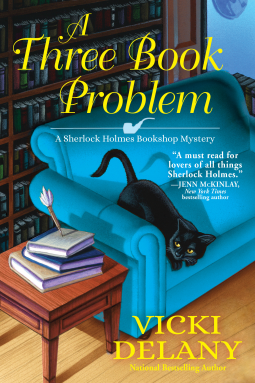The wealthy David Masterson, the host and organizer, is an aficionado of The Great Detective. His “accent is upper-class New York City”.
All working that weekend have been assigned roles and names suitable for an English country house weekend in the late 19th Century. As house staff David has brought his niece, Annie Masterson, a struggling actor to be the maid and his unemployed nephew, Billy Belray, to be the butler / footman / bartender.
Formal attire is expected of the guests. Gemma’s outfit for the opening cocktails is:
…. peach satin, very 1920’s, coming to just below the knee, with straight lines, a dropped waist, and a tassled hem. I paired the dress with a long double strand of fake pearls, my own pearl earrings, and above-the-elbow white gloves.
The guests are a motley crew.
Donald Morris, an esteemed though financially challenged local, is a devout Sherlockian.
Miranda is tall, slender and “sharp boned” befitting a former model. She has virtually no knowledge of Holmes.
Local newspaper reporter, Irene Talbot, is replacing Gemma’s Uncle Arthur, a knowledgeable Sherlockian who has abruptly gone to Spain. She has recently indicated she has aspirations of being a Sherlockian.
Steve Patterson is in his 60’s. A buzz cut former Marine, he is an expert on John Watson’s military career.
Jennifer Griffith, a frizzy haired buxom woman from L.A., is well versed in the Canon.
Cliff Mann is a dealer in letters and first editions with a modest knowledge of Holmes.
Kyle Fraser is a young musician from New York who barely recognizes the name of Sherlock Holmes.
Those guests with enough knowledge are immediately at odds, bickering rather than discussing, such issues as which actors were the best Holmes and Watson in early Sherlockian films. Others concentrate on drinking.
Gemma and I are puzzled about the collection of guests. Why are so many clearly not Sherlockians?
Gemma keeps noticing the superficial maintenance of the grand home, built in 1965, which is for sale including furnishings.
With faux home and faux staff and diverse guests the scene is set for murder and irony.
Gemma’s powers of observation are at their highest when she meets the owner of the manor:
He was in his late fifties, with slicked-back silver hair, a pale face and small dark eyes. The jacket of his blue and gray suit was open to show a crisp white shirt and a black leather belt. His blue silk tie was shot with pink threads, and his shoes were handmade Italian loafers. The suit cost in the two-thousand-dollar range, I guessed, but that money had been spent some time ago. The belt strained under his belly and the trousers were too tight around his plump rear end. A few threads were loose in the cuffs of the shirt, the tie showed traces of a grease stain he’d not been able to get fully out, and a thread of the hand applied stitching on the right shoe was coming loose. The hair at the back of the head was sloppily cut, and he was relying on an excessive amount of hair product, rather than expert styling, to keep it frozen in place. Mr. Daniel Steiner had fallen upon hard times indeed, and he was desperately trying to keep up appearances.
Little time is spent in the tearoom and bookshop though there are nice vignettes of a young sales clerk, Ashleigh, unnerving Gemma with her themed work wardrobe and talent at observation.
Gemma is more discreet than in earlier books in the series. She has learned to keep some of her “observations” to herself. She will “assist” Ryan and Offieer Louise Estrada with their inquiries but with more information and less direction on how to investigate.
A Three Book Problem is a good book but it does not sparkle. The ending had a nice twist that was unconventional. The no Hollywood conclusion is appreciated.



